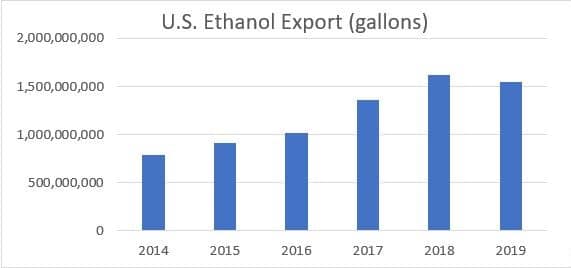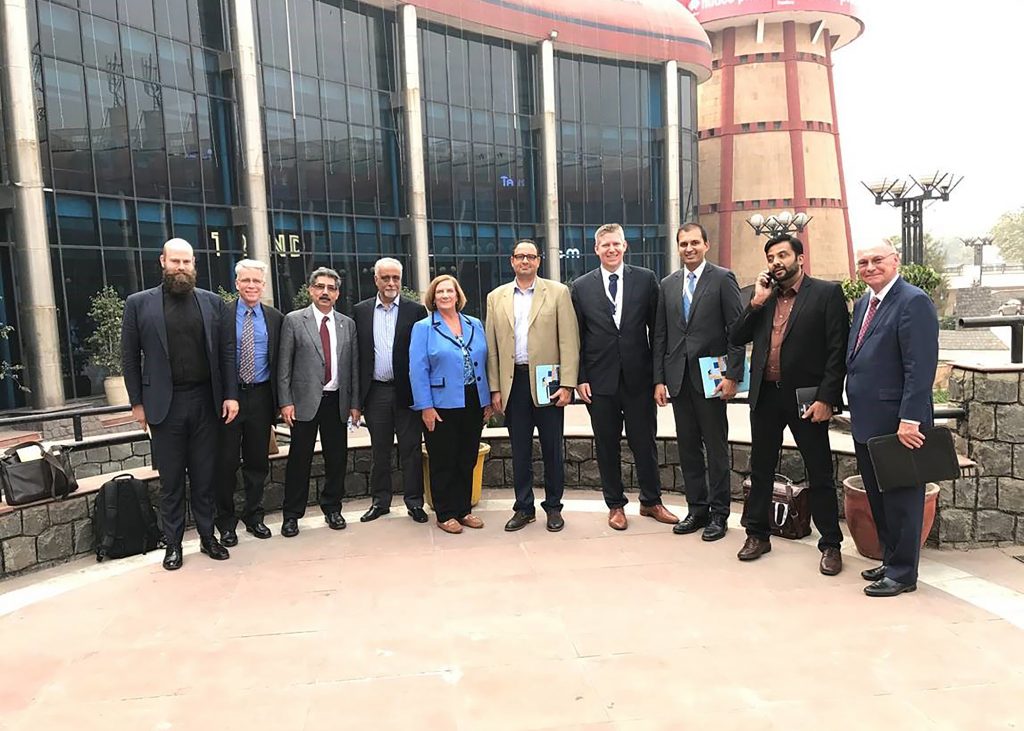With the support of USDA’s Market Access Program (MAP) funds, the U.S. Grains Council, in partnership with USDA’s Foreign Agricultural Service (FAS) and domestic industry associations Growth Energy and the Renewable Fuels Associations, has seen continued success in the promotion of ethanol use globally, resulting in sustained growth in exports of U.S. ethanol.
As a result of the global ethanol market development program across the Council’s nine overseas offices and work in more than 40 ethanol markets to expand policies and demonstrate benefits of expanded ethanol use, 2019 marked the second-largest historical year for U.S. ethanol exports, totaling 1.47 billion gallons with an approximate value of $2.42 billion. Additionally, these exports were just shy of the all-time record high – 1.69 billion gallons in 2018, valued at $2.69 billion. Overall, ethanol exports have rapidly increased since the launch of the Council’s export promotion program in 2014; between the years of 2014-2018, the average annual growth rate for exports was about 20 percent. Through continuous customer engagement, the U.S achieved a market share within global ethanol trade of 60 percent in 2019.

Ethanol exports increased to many key markets in 2019, including top customers like Canada, India, South Korea and the Philippines – all markets where the Council has worked to demonstrate the benefits of expanding ethanol use to help these countries achieve their environmental, human health, and economic goals.
Market access issues in China and Brazil constrained U.S. exports from likely breaking the export volume record in 2019. The Council has worked vigorously to elevate the role of ethanol in the negotiations and implementation of the U.S.-China Phase One deal and to emphasize the need to reduce tariffs constraining ethanol sales to China. The Council and its partners have also worked directly with the U.S. and Brazilian governments and industry to demonstrate the harmful impact that Brazil’s ethanol TRQ has had on Brazilian consumers.
Also in 2019, the Council’s ethanol activities continued in top priority markets, including Japan, Mexico, India, Indonesia, Brazil, Canada and, within constraints, China, as well as in secondary and frontier markets. The Council’s market development strategy includes advocating for the adoption and enforcement of ethanol blending policies that include a role for trade, ultimately expanding the global demand for ethanol and positioning the United States for success as the world’s low-cost supplier. These efforts are accomplished through in-country workshops, reverse trade missions, facilitating technical exchange between governments, ongoing academic research, and maintaining market access for U.S. ethanol.
The Council’s strategy highlights the environmental, human health, and economic benefits that U.S. ethanol can provide as a low cost and environmentally friendly fuel component. The Council supports countries that are developing regulatory frameworks for ethanol blending with technical and policy assistance and works to facilitate trade by connecting international buyers with U.S. exporters. The Council also assumes a key role in collaborating with USDA and the U.S. government more broadly to defend market access for U.S ethanol. In 2019, this included defending against trade policy disputes in Brazil, Peru, Colombia and the European Union.
As global demand for U.S bulk commodity coarse grains has stagnated over the past decade, value-added products such as ethanol and the ethanol co-product distiller’s dried grains with solubles (DDGS) have provided increased value for ethanol producers and feedstock producers alike. Ethanol exports have positively impacted corn and sorghum farmers in the Midwest, with roughly 40 percent of U.S. corn going to ethanol production and 10 percent of the nation’s ethanol supply exported to international markets. Ethanol has become a key component of total exports of U.S. coarse grain in all forms – a trend the Council’s programming will continue to drive.
Learn more about the Council’s work on ethanol here.
About The U.S. Grains Council
The U.S. Grains Council develops export markets for U.S. barley, corn, sorghum and related products including distiller’s dried grains with solubles (DDGS) and ethanol. With full-time presence in 28 locations, the Council operates programs in more than 50 countries and the European Union. The Council believes exports are vital to global economic development and to U.S. agriculture’s profitability. Detailed information about the Council and its programs is online at www.grains.org.

